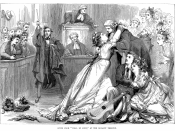I have read two books which deal with trial advocacy. One was "The Common Sense Rules of Trial Advocacy" by Keith Evans (224 pages) and the other was "Advocacy: Evidence, Objections and Exhibits" by Haydock and Sonsteng ( 60 pages read). I had no idea how complicated a trial could be until I started reading these books. I have watched several episodes of 'The Practice' and 'Ally McBeal' and had based my opinions of trials and courtroom behavior on shows similar to these. I know television is much more dramatized and comedic than real life, but I didn't realize how much more depth there was to a trial, though. It isn't as fun as it seems on television. I read so many fascinating things in these books and there are so many topics that I would enjoy writing about, but in this paper I will go over three things I found most interesting in the books I read.
First I will discuss how advocacy is similar to theater. Then I will elaborate on the psychology of advocacy. Finally, I will talk about how complicated it can be to examine a witness.
Advocacy is similar to theater in many ways. I have done a lot of acting in Utah and I have noticed several things about courtroom trials that actors could also use in their auditions. In class when we went over how to not be nervous in the courtroom and how fear is normal behavior, I just kept thinking how I could apply that to my auditions. I had an audition two days after that lesson in class and I did a lot better because I was talking myself through the nervousness I had and practiced calming myself down. Keith Evans goes over how theater is helpful in advocacy...


